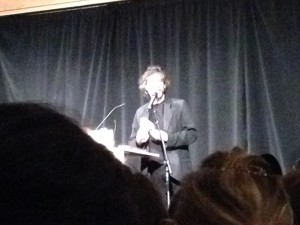
Some authors are more gifted with sentences than voices and when they speak, their words sound wrong because they don’t sound the way they do when you’re reading their words in your own head.
Despite having heard Neil Gaiman on YouTube, I was a little worried before I went to his reading last night.
Sure, he comes with a British accent and a lovely voice, but what if his rhythm sounded all wrong when he was just talking?
What if he said or did something that wiped away the magic?
Ironically, Neil Gaiman talked about the very same thing last night, mentioning that he now avoids certain famous people because he wants to hold the image he has of them in his head.
And that’s the thing about Neil Gaiman, he has this uncanny ability to bring up the thing that you’re thinking about at the moment, like he’s been thinking about it, too. The only thing is that being a master storyteller, he’s quite a bit better with the words — he tells you the story you didn’t recognize in your own heart.
The substance of the reading was surprisingly simple. Neil asked attendants to distribute index cards through the crowd. It seemed like three out of four of the 1,200 people at the sold-out event wrote questions. During the reading, he shuffled through them in a bit, but he took them more or less as they came and fashioned the night into a story just for us.
Some questions were simple like “Where did you get the idea for ‘Fortunately, the Milk,’ and some more complicated, like the reader who mentioned that she’d been dealing with a lot of death lately and wondered what Neil had to say about death and mourning.
Neil spoke about the death of his good friend and fellow writer Terry Pratchett. They wrote “Good Omens” together a long while back. He talked about how even when you knew death was coming it could “take you by surprise.” And then he read an excerpt from “Good Omens” — a bit he remembers as being written mostly by Terry.
The scene where the demon tries to convince the angel to thwart Armageddon sounds very much like two old friends getting drunk together and the sense that Neil would have liked to drink with Terry one last time was palpable, especially when he referenced the scene and talked about death drawing a “bottom line” on thirty years of friendship.
Neil also worked in two stories from his new short story collection “Trigger Warning: Short Fictions and Disturbances.” The one about the uninventor and “Click-Clack the Rattlebag.” The later is a classic horror tale written with the kind of clear story that leaves grown ups afraid to wander into the dark.
Towards the end of the evening, Neil addressed how he chooses what to write.
Apparently, back in 2001, when “American Gods” came out (which is currently being made into TV series), he had an editor claim she could make him a “proper successful writer” if he would agree to write only books like “American Gods,” “but a little different.”
Fortunately, Neil has no intention of doing that. “What I really like doing is whatever the fuck I want to,” he says.
And while we were still thinking about the courage it takes to do what you really want to do, he went on with an analogy about writing, getting quite particular about the difference between an old English sweet shop and a candy store. The jars make all the difference. As he says, “because in a sweet shop, everything comes in huge jars. All these jars, more strange or peculiar than anyone can eat. I will never, if I live to 100, get to know what’s in every jar.” But he imagines writing is a like being locked in that shop over night, “desperate to get my hands in as many jars as I can before they open it up and catch me and drag me out.”
Makes you want to run off with the shop owner’s keys, doesn’t it?
This isn’t even close to what it’s like to hear Neil in person. If he comes to town, go. If comes within a three-hour drive and you don’t have a car, rent one.